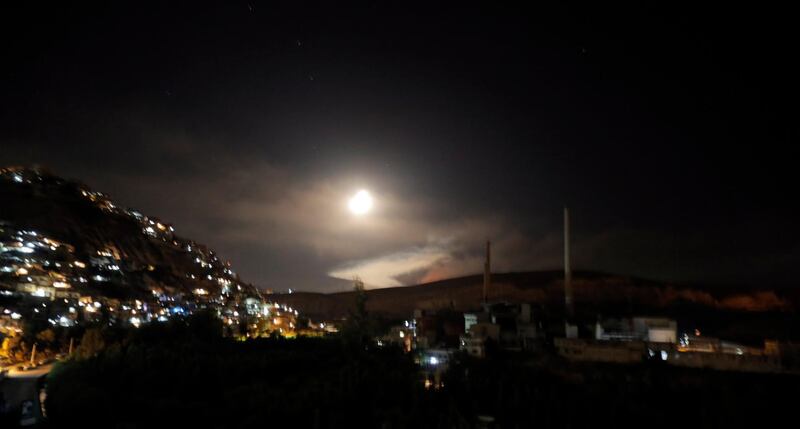Israel has carried out fresh strikes in Syria that have killed 10 pro-regime fighters in response to rare rocket fire towards the occupied Golan Heights.
Sana, Syrian state media, quoted an unnamed military official as saying that Israeli attacks struck military positions in the southern region of Quneitra early on Sunday.
The Israeli military said that two rockets had been fired towards Mount Hermon had been launched from Syria late on Saturday evening and one of the projectiles had been “located within Israeli territory."
In response, the military struck "two Syrian artillery batteries, a number of observation and intelligence posts on the Golan Heights and an SA-2 aerial defence battery," a statement said.
The Israeli attack left three Syrian soldiers and seven Iranian and Hezbollah fighters dead, the British based Syrian Observatory for Human Rights said.
There were no reported casualties on the Israeli side and the military said that one of the rockets landed in open ground near a military base.
It is rare that rockets have intentionally been fired from Syria into Israel, and previous cases drew a swift response.
Israel has expressed significant concern over the years at the threat of Iranian proxies operation in southern Syria. Tel Aviv pushed Russia to provide guarantees that Iranian backed forces would not operate near the Israeli Golan after Damascus, backed by Tehran and Moscow, recaptured the south of the country last year.
Israel has acknowledged carrying out hundreds of strikes in Syria against Iranian targets and their proxies.
After the latest incident, Israeli Prime Minister Benjamin Netanyahu said he had ordered the strike.
"We won't tolerate fire at our territory and will respond forcefully to any aggression against us," he said.
Most of the Israeli strikes have targeted shipments of sophisticated weapons being transferred to Iranian proxies as well as their arms depots, headquarters and weapons systems in Syria.
Iran has entrenched itself militarily in Syria, where Tehran backs President Bashar Al Assad in the country's eight-year war which has killed more than 370,000 people.
The stand-off had been simmering since the United States last year withdrew from the 2015 nuclear treaty which Iran reached with major world powers.
In recent weeks the United States has accused Iran of alleged threats and deployed an aircraft carrier group and B-52 bombers to the Gulf.
Iran and it’s proxies such as Hezbollah have long said they would respond to the Israeli strikes when the timing was right.
Lebanon’s Hezbollah has been fighting Israel for decades. As well as their highly efficient guerrilla campaign against Israel that forced their hasty withdrawal in 2000 and the collapse of the Tel Aviv backed, hardline South Lebanon Army.
What followed was a low-level cross border tit-for-tat conflict until Israel invaded following a cross border raid in 2006 that left several soldiers dead and two captured. Over 1,000 Lebanese, overwhelmingly civilians, and around 121 Israeli soldiers and 44 civilians were killed in the 34-day war.
Since then, the southern border region of Lebanon has been relatively peaceful.
However, analysts have pointed to Hezbollah’s targeted pinprick tactics in the years before the 2006 war as a likely model for Iranian forces to retaliate against Israeli strikes.






